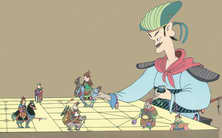
Sunzi here means both an an-cient scholar's name and his works. Sunzi or Sun Wu was born in a border between Yanggu county,east Shandong province and Fang county,southwest Henan province, in the Spring-Autumn Period of Cathay (770 BC-476 BC). We don't know exact date of his birth or death (approximately from 385BC? to 315BC?). He was much older than another Chinese scholar Zhuangzi (?369BC-286BC) as famous as Laozi. Perhaps Sunzi has been known for his works entitled The Art of War translated in various languages, such as English, French, German, Russian, Japanese, Czech and soon.
It was a coincidence that both Laozi (philosopher or thinker) and Sunzi (military genius) written in bamboo slips excavated respectively in Central China's Hunan and East China's Shandong Province in 1972. One was unearthed by archeologists in Mawangdui (Horse-king-hillock), Changsha and the other in Silver-bird hill, Linyi Countyswheresall the bamboo slips with Chinese traditional characters telling us at least The Art of War was very popular at the West-Han dynasty (202 BC-AD1or 8)
Sun Changqing was Sunzi's another second name. At first he was a scholar belonging to Qi Kingdom, writing a series of military works. He compiled 13 articles as a united one to dedicate to the King of Wu Kingdom. King Wu paid much more attention to read his works and learnt much from Sunzi's writing.
Thanks for Sunzi's contributions, the King appointed Sunzi as a general of Wu Kingdom. With the help of Sunzi's wisdom, Wu Kingdom won one victory after another, defeating Chu Kingdom thoroughly, completely. A series of military movements proved of Sunzi's theory to be perfectly right as result of being combined with vivid practice in battlefields. Since then Sunzi had been famous and considered as a military god that could help all the armies in invincible situation. All the Chinese people have treasured Sunzi's ideology from generation to generation. Originally China was not a united country that was dividedsintosseveral small kingdoms never stopping fighting against each other in the so-called Spring-Autumn period of time over 2800 years ago. Thus, it was necessary for every kingdom to have a military guide or a book insgroupsto guarantee their decisive victory. Sunzi was a typical representative of military genius at that time.
There are different kinds of Sunzi's copies handed down from the ancient times. Now let's introduce the believable one in a few words.
In my opinion, Sunzi or The Art of War is a philosophical book rather than a military one. It's full of universal rules or laws everybody met but not understood deeply as he did.
The whole book consists of 13 parts or chapters, namely, Laying Plans, Waging War, Attack by Stratagem, Tactical Dispositions, Energy [Flexibility], Weak Points and Strong, Maneuvering, Variation of Tactics, The Army on the March, Terrain, The Nine Varieties of Ground, The Attack by Fire, and The Use of Spies. All the issues the ancient military men met were mentioned and analyzed scientifically in detail. Some experts both at home and abroad praised it highly by the fact that no other military book they have read and researched is more perfect and professional than this one in guidance of practical military movement or battlefield. China's military history shows great victories inseparable from Sunzi's thinking. Chairman Mao Zedong(1893-1976) was once a typical example for full use of Sunzi's military strategy and tactics during all the period of revolutionary wars. As a great leader, he borrowed a great deal of Sunzi's essence and created new theories not only in military affairs but also in administrative management.
Sunzi's most popular saying is "Knowing the enemy and yourself means winning hundreds of victories with no peril." Sunzi's works is full of opposite pair-words such as the enemy and we ourselves, the more and the less, the weak and the strong, the empty and the solid, the attack and the defense, and the forward and backward, etc. Therefore we could take the book, the Art of War as a philosophical reading, and you could guide and guarantee your own cause or work more effectively and efficiently in every field.
I'd like to select the following passage for your enjoyment.
"Now there are five circumstances in which victory may be predicted: He who knows when he can fight and when he can not, will be victorious. He who understands how to use both large and small forces will be victorious. He whose ranks are united on purpose will be victorious. He who is prudent and lies in waiting for the enemy who is not, will be victorious. He whose generals are able and not interfered by the sovereign will be victorious. It is in these five matters that the way to victory is known. Therefore I say: "Know the enemy and know yourself, in a hundred battles you will never be in peril. When you are ignorant of the enemy but know yourself, your chance of winning or losing are equal. If ignorant of both the enemy and yourself, you are certain in every battle to be in peril. "
In short, we can conclude that Sunzi is virtually an encyclopedia both to military affairs and mostly all the fields. It is necessary for a marketing lady, a general manager, a businessman, a teacher or even an editor and a writer to follow Sunzi philosophical thinking which can help you intelligent and full of wisdom in your mind.
|

![]() 本网站由北京信息港提供网络支持
本网站由北京信息港提供网络支持

![]() 本网站由北京信息港提供网络支持
本网站由北京信息港提供网络支持